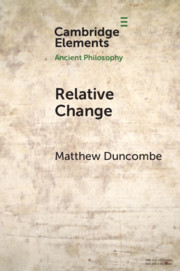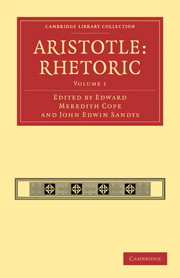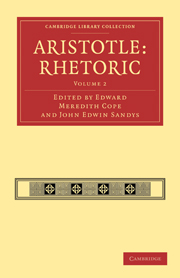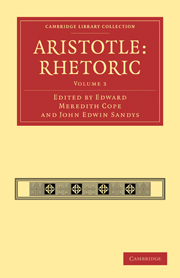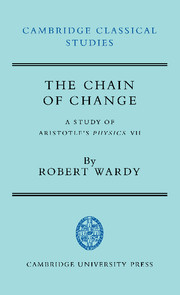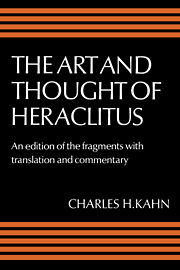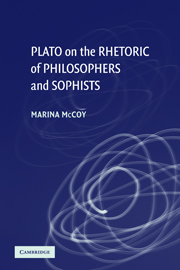Relative Change
Part of Elements in Ancient Philosophy
- Author: Matthew Duncombe, University of Nottingham
- Date Published: October 2020
- availability: Available
- format: Paperback
- isbn: 9781108713429
Paperback
Other available formats:
eBook
Looking for an inspection copy?
This title is not currently available on inspection
-
A relative change occurs when some item changes a relation. This Element examines how Plato, Aristotle, Stoics and Sextus Empiricus approached relative change. Relative change is puzzling because the following three propositions each seem true but cannot be true together: (1) No relative changes are intrinsic changes; (2) Only intrinsic changes are proper changes; (3) Some relative changes are proper changes. Plato's Theaetetus and Phaedo property relative change. I argue that these dialogues assume relative changes to be intrinsic changes, so denying (1). Aristotle responds differently, by denying (3) that relative change is proper change. The Stoics claimed that some non-intrinsic changes are changes (denying (2)). Finally, I discuss Sextus' argument that relative change shows that there are no relatives at all.
Customer reviews
Not yet reviewed
Be the first to review
Review was not posted due to profanity
×Product details
- Date Published: October 2020
- format: Paperback
- isbn: 9781108713429
- length: 75 pages
- dimensions: 150 x 230 x 3 mm
- weight: 0.12kg
- availability: Available
Table of Contents
Introduction
1. Plato
2. Aristotle
3. Stoics and Sceptics
Conclusion.
Sorry, this resource is locked
Please register or sign in to request access. If you are having problems accessing these resources please email [email protected]
Register Sign in» Proceed
You are now leaving the Cambridge University Press website. Your eBook purchase and download will be completed by our partner www.ebooks.com. Please see the permission section of the www.ebooks.com catalogue page for details of the print & copy limits on our eBooks.
Continue ×Are you sure you want to delete your account?
This cannot be undone.
Thank you for your feedback which will help us improve our service.
If you requested a response, we will make sure to get back to you shortly.
×
